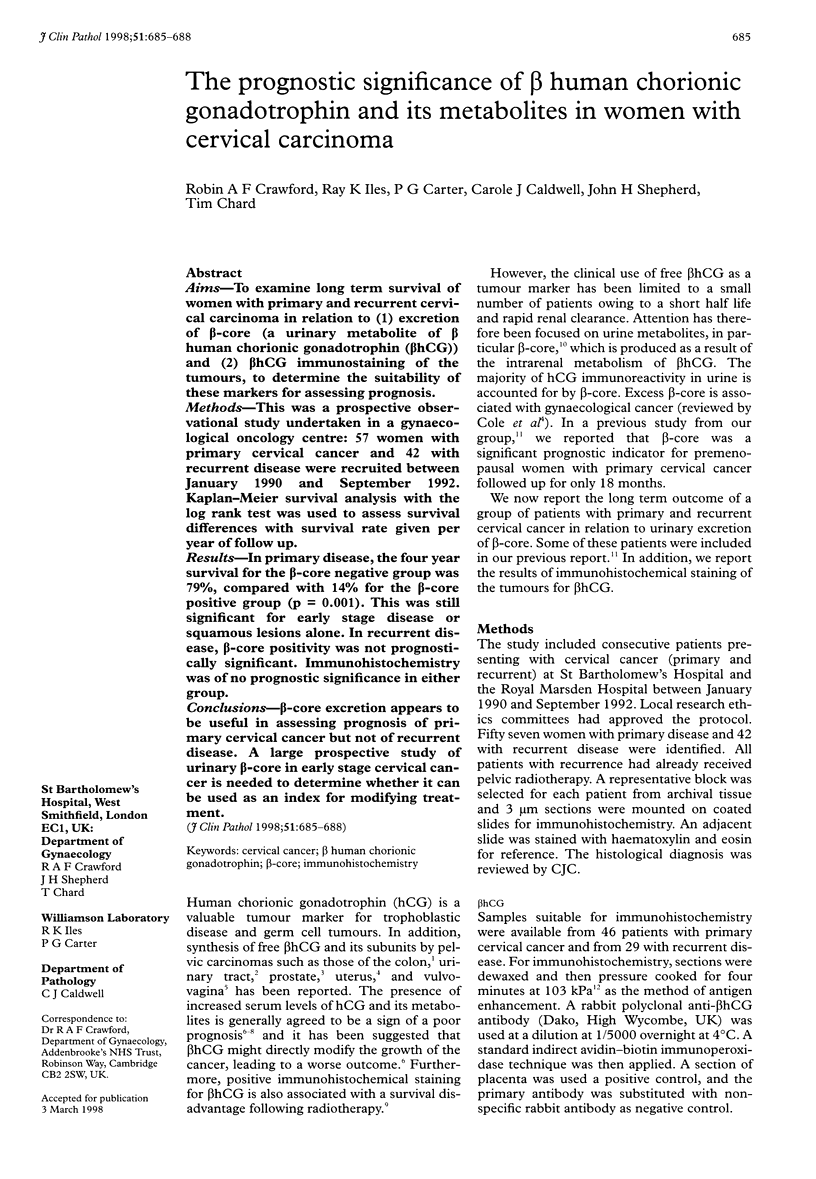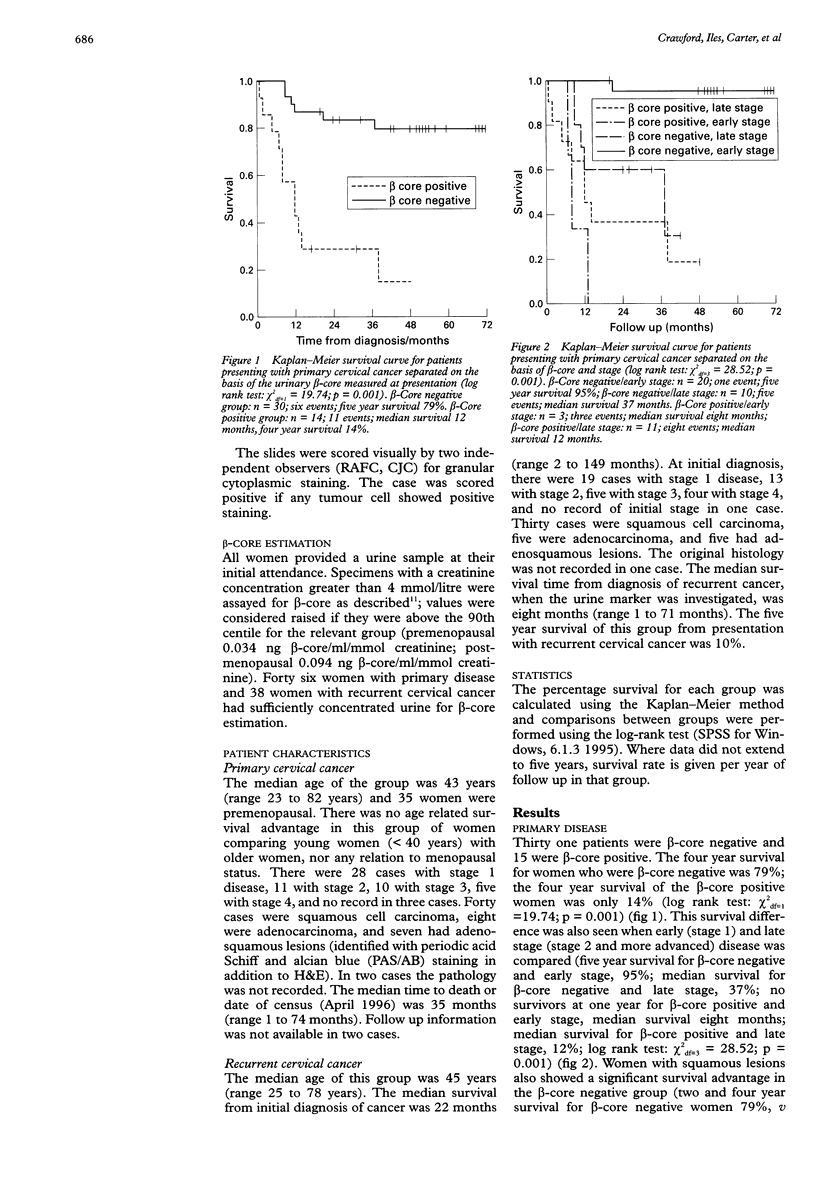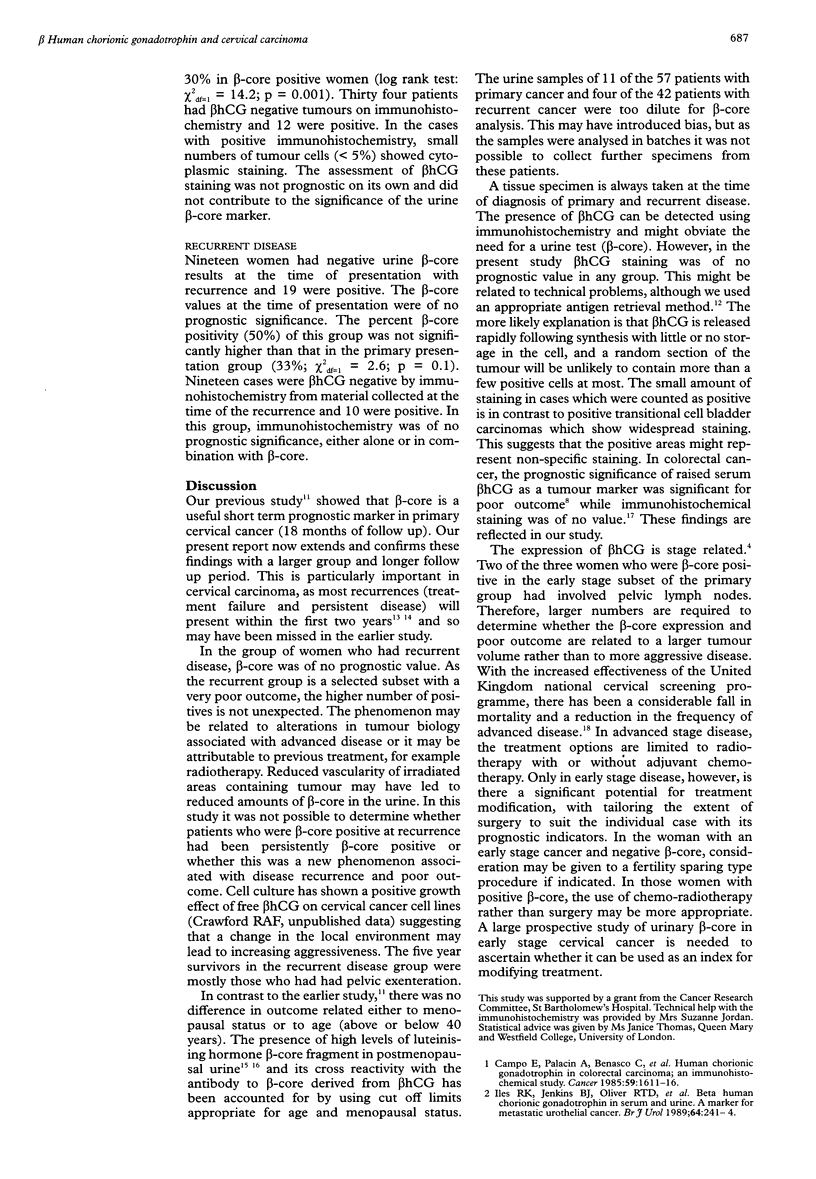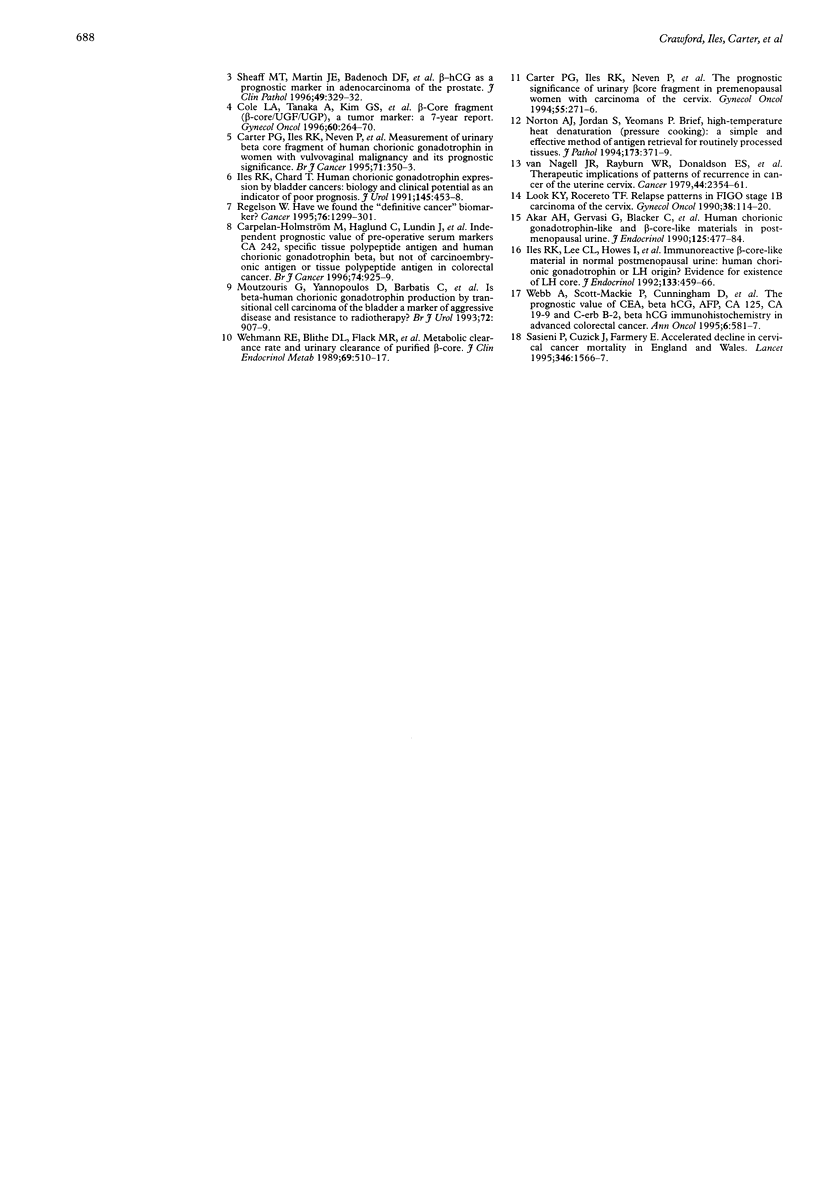Abstract
AIMS: To examine long term survival of women with primary and recurrent cervical carcinoma in relation to (1) excretion of beta-core (a urinary metabolite of beta human chorionic gonadotrophin (beta hCG)) and (2) beta hCG immunostaining of the tumours, to determine the suitability of these markers for assessing prognosis. METHODS: This was a prospective observational study undertaken in a gynaecological oncology centre: 57 women with primary cervical cancer and 42 with recurrent disease were recruited between January 1990 and September 1992. Kaplan-Meier survival analysis with the log rank test was used to assess survival differences with survival rate given per year of follow up. RESULTS: In primary disease, the four year survival for the beta-core negative group was 79%, compared with 14% for the beta-core positive group (p = 0.001). This was still significant for early stage disease or squamous lesions alone. In recurrent disease, beta-core positivity was not prognostically significant. Immunohistochemistry was of no prognostic significance in either group. CONCLUSIONS: beta-core excretion appears to be useful in assessing prognosis of primary cervical cancer but not of recurrent disease. A large prospective study of urinary beta-core in early stage cervical cancer is needed to determine whether it can be used as an index for modifying treatment.
Full text
PDF



Selected References
These references are in PubMed. This may not be the complete list of references from this article.
- Akar A. H., Gervasi G., Blacker C., Wehmann R. E., Blithe D. L., Nisula B. C. Human chorionic gonadotrophin-like and beta-core-like materials in postmenopausal urine. J Endocrinol. 1990 Jun;125(3):477–484. doi: 10.1677/joe.0.1250477. [DOI] [PubMed] [Google Scholar]
- Campo E., Palacin A., Benasco C., Quesada E., Cardesa A. Human chorionic gonadotropin in colorectal carcinoma. An immunohistochemical study. Cancer. 1987 May 1;59(9):1611–1616. doi: 10.1002/1097-0142(19870501)59:9<1611::aid-cncr2820590915>3.0.co;2-h. [DOI] [PubMed] [Google Scholar]
- Carpelan-Holmström M., Haglund C., Lundin J., Alfthan H., Stenman U. H., Roberts P. J. Independent prognostic value of preoperative serum markers CA 242, specific tissue polypeptide antigen and human chorionic gonadotrophin beta, but not of carcinoembryonic antigen or tissue polypeptide antigen in colorectal cancer. Br J Cancer. 1996 Sep;74(6):925–929. doi: 10.1038/bjc.1996.458. [DOI] [PMC free article] [PubMed] [Google Scholar]
- Carter P. G., Iles R. K., Neven P., Ind T. E., Shepherd J. H., Chard T. Measurement of urinary beta core fragment of human chorionic gonadotrophin in women with vulvovaginal malignancy and its prognostic significance. Br J Cancer. 1995 Feb;71(2):350–353. doi: 10.1038/bjc.1995.70. [DOI] [PMC free article] [PubMed] [Google Scholar]
- Carter P. G., Iles R. K., Neven P., Ind T. E., Shepherd J. H., Chard T. The prognostic significance of urinary beta core fragment in premenopausal women with carcinoma of the cervix. Gynecol Oncol. 1994 Nov;55(2):271–276. doi: 10.1006/gyno.1994.1289. [DOI] [PubMed] [Google Scholar]
- Cole L. A., Tanaka A., Kim G. S., Park S. Y., Koh M. W., Schwartz P. E., Chambers J. T., Nam J. H. Beta-core fragment (beta-core/UGF/UGP), a tumor marker: a 7-year report. Gynecol Oncol. 1996 Feb;60(2):264–270. doi: 10.1006/gyno.1996.0036. [DOI] [PubMed] [Google Scholar]
- Iles R. K., Jenkins B. J., Oliver R. T., Blandy J. P., Chard T. Beta human chorionic gonadotrophin in serum and urine. A marker for metastatic urothelial cancer. Br J Urol. 1989 Sep;64(3):241–244. doi: 10.1111/j.1464-410x.1989.tb06006.x. [DOI] [PubMed] [Google Scholar]
- Iles R. K., Lee C. L., Howes I., Davies S., Edwards R., Chard T. Immunoreactive beta-core-like material in normal postmenopausal urine: human chorionic gonadotrophin or LH origin? Evidence for the existence of LH core. J Endocrinol. 1992 Jun;133(3):459–466. doi: 10.1677/joe.0.1330459. [DOI] [PubMed] [Google Scholar]
- Look K. Y., Rocereto T. F. Relapse patterns in FIGO stage IB carcinoma of the cervix. Gynecol Oncol. 1990 Jul;38(1):114–120. doi: 10.1016/0090-8258(90)90021-c. [DOI] [PubMed] [Google Scholar]
- Moutzouris G., Yannopoulos D., Barbatis C., Zaharof A., Theodorou C. Is beta-human chorionic gonadotrophin production by transitional cell carcinoma of the bladder a marker of aggressive disease and resistance to radiotherapy? Br J Urol. 1993 Dec;72(6):907–909. doi: 10.1111/j.1464-410x.1993.tb16294.x. [DOI] [PubMed] [Google Scholar]
- Nayar H. S., Goyle B. R., Kalhan V. K., Singh S., Verma S. S. Prescriptive zones of hot and humid environments for acclimatised Indians. Indian J Med Res. 1980 Dec;72:901–907. [PubMed] [Google Scholar]
- Norton A. J., Jordan S., Yeomans P. Brief, high-temperature heat denaturation (pressure cooking): a simple and effective method of antigen retrieval for routinely processed tissues. J Pathol. 1994 Aug;173(4):371–379. doi: 10.1002/path.1711730413. [DOI] [PubMed] [Google Scholar]
- Regelson W. Have we found the "definitive cancer biomarker"? The diagnostic and therapeutic implications of human chorionic gonadotropin-beta expression as a key to malignancy. Cancer. 1995 Oct 15;76(8):1299–1301. doi: 10.1002/1097-0142(19951015)76:8<1299::aid-cncr2820760802>3.0.co;2-l. [DOI] [PubMed] [Google Scholar]
- Sasieni P., Cuzick J., Farmery E. Accelerated decline in cervical cancer mortality in England and Wales. Lancet. 1995 Dec 9;346(8989):1566–1567. doi: 10.1016/s0140-6736(95)92099-4. [DOI] [PubMed] [Google Scholar]
- Sheaff M. T., Martin J. E., Badenoch D. F., Baithun S. I. beta hCG as a prognostic marker in adenocarcinoma of the prostate. J Clin Pathol. 1996 Apr;49(4):329–332. doi: 10.1136/jcp.49.4.329. [DOI] [PMC free article] [PubMed] [Google Scholar]
- Webb A., Scott-Mackie P., Cunningham D., Norman A., Andreyev J., O'Brien M., Bensted J. The prognostic value of CEA, beta HCG, AFP, CA125, CA19-9 and C-erb B-2, beta HCG immunohistochemistry in advanced colorectal cancer. Ann Oncol. 1995 Jul;6(6):581–587. doi: 10.1093/oxfordjournals.annonc.a059248. [DOI] [PubMed] [Google Scholar]
- Wehmann R. E., Blithe D. L., Flack M. R., Nisula B. C. Metabolic clearance rate and urinary clearance of purified beta-core. J Clin Endocrinol Metab. 1989 Sep;69(3):510–517. doi: 10.1210/jcem-69-3-510. [DOI] [PubMed] [Google Scholar]
- van Nagell J. R., Jr, Rayburn W., Donaldson E. S., Hanson M., Gay E. C., Yoneda J., Marayuma Y., Powell D. F. Therapeutic implications of patterns of recurrence in cancer of the uterine cervix. Cancer. 1979 Dec;44(6):2354–2361. doi: 10.1002/1097-0142(197912)44:6<2354::aid-cncr2820440653>3.0.co;2-j. [DOI] [PubMed] [Google Scholar]


